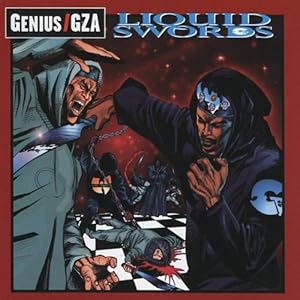Everyone's heard of Stockhausen but my impetus to start listening came from a sort of strange event. I have Amazon Prime which my family loves to use for free shipping, to the point where my Dad was buying my own Christmas presents using my account. You know I can see that, right? Granted it was mainly CD's from a list which I had previously furnished - with the exception of one collection of Stockhausen pieces that I saw had been placed into my cart and later removed.
Well, Christmas came and went and no one had any recollection of even considering purchasing that album for me. My suspicion is that my Dad made a wrong turn in the series of tubes. I took it as a sign from the fates that I needed to start listening to Stockhausen, so I bought that collection. It's full of pieces like Zykus (unstructured random sounding percussion), Spiral (unstructured short wave radio signals and obscure electronic synthesizer), Wach (unstructured piece whose only score is a bit of text along the lines of "penetrate into the other players' notes. Let them penetrate your note"), and In Freundschaft (a collection of short fragmented melodies for solo trumpet).
It was all pretty confounding. Kind of interesting to listen to in the right mood. I ultimately determined that if I picked a couple more of his better known pieces, maybe I would start to get an idea of what the "big picture" was.
The upshot of all that: I soon became the proud owner of Helikopter-Streichquartett. I won't try to do the concept justice here, but essentially it's a piece which consists of a string quartet, each member of which flies in a separate helicopter while the sounds of the four rotors are mixed in with the music and piped to an audience down below. Seemed like a no-brainer addition to my CD collection.
Listening to this now, it's roughly what you might expect. The helicopter noises mix innocuously enough with the strings. The actual music is a sort of abstract meandering piece where the strings try to imitate the cadences and sonorities of a helicopter rotor, or something.
I guess it's safe to say I haven't been blown away by this CD. I haven't spent much time listening to it after the initial week when I bought it 6 months ago. Sonically, the mixture of strings and mechanical noises isn't too radical. Lots of experimental or industrial artists outside of classical might have some conventional instrumentation layered with some samples or found sound. In those contexts (or even just sitting in my lab) it's relatively easy for me to focus on the subtleties of mechanical noises and get some enjoyment out of it. The thing that's different about Helikopter-Streichquartett is that the rotors are SO familiar from everyday life. It's very hard to listen to it and try to perceive an interaction with the strings. Your brain says "I know what a helicopter sounds like" and overwhelmingly perceives it as some string music with helicopters in the background.
To try to experience this piece as if you never heard the sound of a helicopter before requires a lot of effort and is kind of a nice exercise. After all, the sound of the rotors is fairly dynamic and the interaction with the strings should logically give rise to a lot of interesting sound combinations. Nonetheless I don't readily hear anything other than background noise in the helicopters. If this piece eventually got me to penetrate some mental block that I've developed over years of hearing helicopters fly by, it seems like that would valuable for the further emancipation of my ears.
Successful or not in practice, as a concept the whole thing sets pretty well with me - until you get to sections of the piece in which the performers count audibly together in German(?), in very silly voices. I'm sure there's a high-art justification for Stockhausen's choice here, but it's in stark opposition to the perspective from which I'm attempting to engage with the piece: where the helicopter loses its familiarity and functions as a disembodied source of complex sounds. The human voices do the opposite - violently return you to the reality of the performers sitting in the helicopters, and whatever prestige, pretention, intellect, and spectacle comes along with that.
Interestingly, while I would attempt to experience this piece in a vacuum, most listeners apparently agree that the concept very much IS the piece. In fact there was a lot of criticism of this recording because it's not a document of one of the performances - it's a studio recording mixed with some canned helicopters. From my perspective, that doesn't matter at all. You wouldn't be able to tell that this was the case unless someone told you, so how can it possibly influence your enjoyment? It's like morons who won't eat hot dogs.
Ultimately I think I'm approaching this whole thing from a philosophy akin to that other emperor, John Cage. I'm still not sure what to think about Stockhausen. Hearing this hasn't helped me connect any further with any of his other pieces. Then again, several years ago I was listening to Today is the Day and Sunn 0))) and feeling curious but not really getting anything out of it. Now those are two of my favorite bands. So I'm patient about letting Stockhausen's music sit with me over time.
It's kind of conflicting when you're walking around outside listening to this and another aircraft flies overheard. Is that supposed to enhance the piece? John Cage would probably say yes. What would Stockhausen think?









